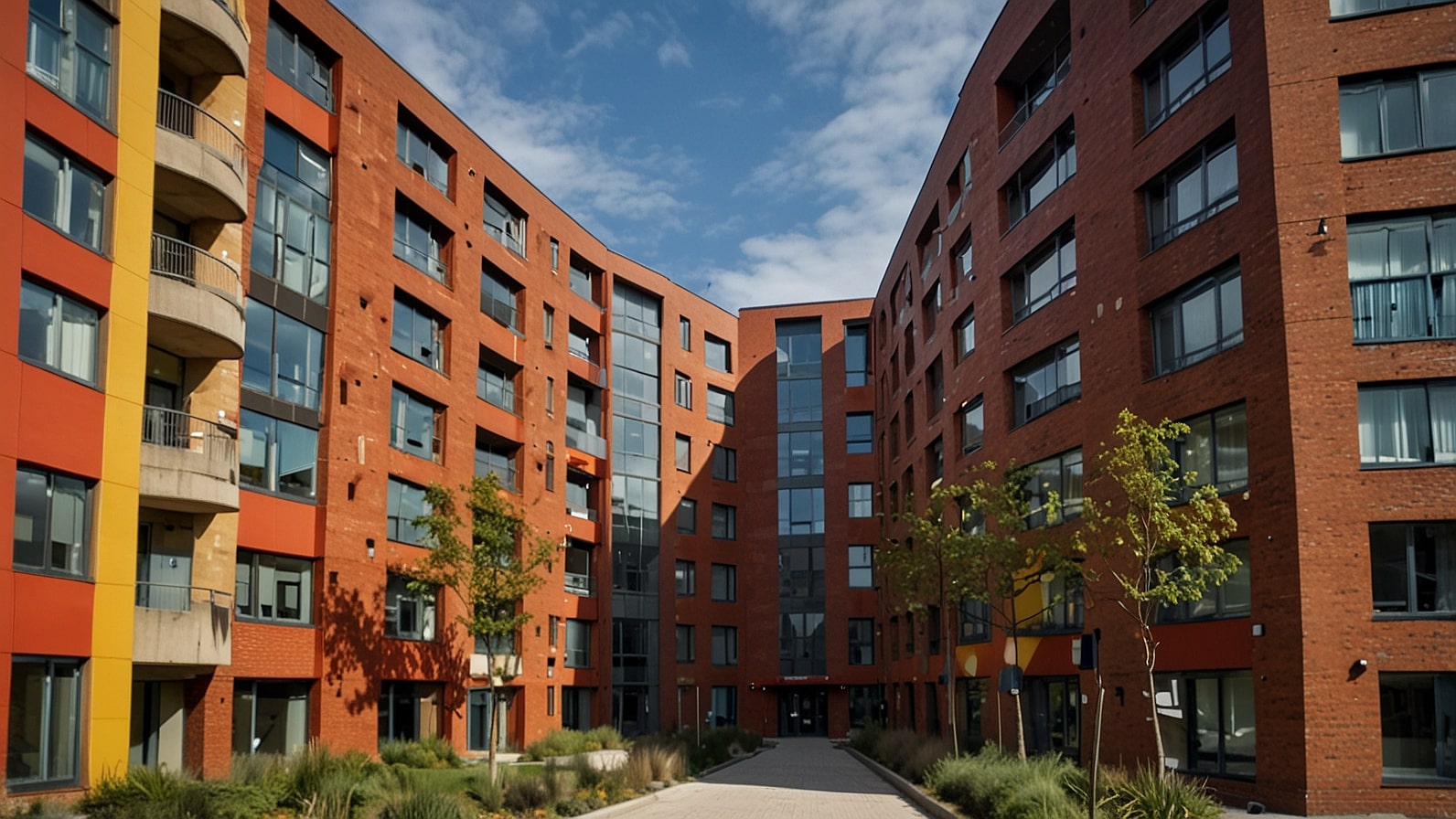
Unite Group Shares Plunge 5% as Student Beds Sales Miss Targets Amid Rental Growth Slowdown
London, October 8, 2025 – Unite Group PLC, the largest student accommodation company in the United Kingdom, fell 5 per cent. In mid-afternoon trading on Wednesday, the company announced lower-than-anticipated student bed sales and reduced growth in rental revenues.
The FTSE 250-listed company sustained its full-year guidance, although it pointed out the challenges of weakening demand in major university markets, which raised concerns among investors about the post-pandemic recovery in the sector.
The revision, which was before the market opened, showed that Unite had sold 5,200 student beds in the third quarter, below the forecasts by the analysts who predicted 5,500 beds.
The period rental growth decelerated to 4.8% on a year-on-year basis compared to 5.5% in the previous quarter, with the international student enrollments meeting resistance due to visa limitations and economic constraints. Despite these misses, the company reiterated its underlying profit before tax forecasts of £140 million to £150 million by the end of the fiscal year on December 31, 2025.
Share price of Unite went down to 912 pence per share, losing more than 100 million in market value, and it underperformed the wider FTSE 250, which went up by 0.2%. Year-to-year, the shares have risen 12 per cent, supported by a rise in the number of domestic students, but the revelation on Wednesday dampened the optimism.
Market Leadership Sector Headwinds Test Unite
Unite, which operates more than 70,000 beds in 130 purpose-built student accommodations (PBSAs) in major university centres such as Manchester, Bristol, and Edinburgh, blamed the deficit on the existence of a conservative booking climate due to the affordability pressures at large.
As the UK inflation rate remains at 2.1 per cent and living standards continue to strain budgets, would-be students are postponing their choices or considering cheaper off-campus alternatives.
According to the trading statement by CEO Richard Smith, the international growth has been dampened by geopolitical tensions and currency, but the domestic demand has proved to be robust.
The firm observed a 3 per cent decrease in bookings by foreign students, especially those in Asia, as the UK introduced stricter immigration rules earlier this year. In response to that, Unite has intensified its marketing campaigns with more than 200 universities joining its leasing program to provide flexible leasing and other services, such as high-speed internet and study areas.
The student housing sector is a PS5 billion yearly investment market that has seen a surge in investment following the lifting of COVID-19 measures. The portfolio of Unite, with 95 per cent occupancy rates, makes it a defensive play on the real estate, and with long-term properties, Unite has predictable cash flows.
Nonetheless, the increase in interest rates to the current 4.75% after the recent Bank of England hold has raised the cost of borrowing to make expansions, leading to a reduction of planned expansions by 10 per cent in 2026.
Shareholder Panic In Greater Real Estate Fears
The knee-jerk reaction in the market reflects the increasing anxiety in the UK property market, in which commercial real estate values have declined by 15 per cent since reaching highs in 2022.
Researchers at Jefferies dropped Unite to Hold instead of Buy, citing the dangers of additional visa restrictions by the current government. The size of Unite is a buffer, but such misses may be an indicator of peak cycle amongst student lets, and the price target was cut by half to 950 pence.
Yet, not all views are bearish. Peel Hunt has added to its existing Buy rating, citing the PS1.1 billion development pipeline of Unite and its forward dividend yield of 4.1, which is healthy in a low-growth economy.
The firm estimated that rentals would improve by 5 per cent or more in 2026 due to its focus on high-quality, city-centre assets. Unite shares are trading at 12 times forward earnings, which is considered fairly reasonable given that other places, such as IQ Student Accommodation, are being valued at 14 times.
This is against a backdrop of sound university enrolment figures: UK higher education agencies have predicted 2.5 per cent growth in full-time students in 2025/26, with projections of 1.8 million undergraduates by 2028. Unite, 85 per cent of which is UK-based, is in a good position to seize this, as it had sold non-core assets for PS 200 million last year to finance premium builds.
Tactical Measures to Strengthen Resilience
To push through the turbulent waters, Unite announced its plans to spend PS300 million within two years to upgrade its sustainability, such as solar panels and energy-efficient insulation in 40 of its properties.
This is in line with the net-zero aspirations of the UK and may open green financing at reduced rates. The company is also engaging in joint ventures with institutional investors like pension funds to co-develop sites in emerging hot spot areas like Coventry and Sheffield.
Smith emphasised efficient operations, whereby vacancy rates have decreased by 7 per cent due to efficient dynamic pricing algorithms to adjust rents in real time according to demand.
He added that they are not simply offering beds but building communities that increase the success of students. Such efforts will boost margins by 150 basis points to endorse the reiterated profit expectations.
Managing Economic and Regulatory Risk
Challenges abound, however. The governmental overview of student visas, which will be completed in November, might limit the number of students to 300,000 per year in the international intakes- reduced to 2024’s 450,000- which has the potential to cut 2 per cent of the sector incomes.
Maintenance and housekeeping shortages of labour, which were worsened by Brexit, also increased costs by 6%. Unite has reduced this through PS50 million wage investment, and margins stand at 42 per cent.
The macroeconomic indicators are more encouraging and concerning at the same time. GDP growth of 0.6% in Q3 is a good sign that the economy is stable, but consumer confidence is at its lowest in two years.
In the case of Unite, the holiday letting market, which involves renting out the vacant beds in the period between summers, has shot 20 per cent and has earned the business PS15 million in revenue, as well as diversifying its income.
Conclusion to UK Real Estate Investors
The update of Unite is a dark omen to the PS12 billion PBSA market, in which yields have been driven to 4.5% as investors abandon it to seek a safer haven in other assets such as logistics.
Other peers, such as Student Castle and Watkins Jones, are under the same pressure; their shares are down 8 and 10 years-to-date, respectively. However, the basics in the sector, such as the ongoing under-supply of 500,000 beds, are a long-term positive indicator.
The 4.1 per cent dividend paid by Unite is attractive to yield-seeking investors, which is 1.8 times the amount of earnings. With the full-year results set to be announced on February 26, 2026, attention will be focused on occupancy trends and acquisition activity.
The wrong move of Unite can present an opportunity to purchase in the market that is in need of stability for the investors who bet on the long-term effects of education.
With British universities preparing to enter a new academic year, Unite Group is at the crossroads of potential and risk, and to investors, this is a reminder that not even the most fundamental industries are above the changing environment in the UK.


 Bitcoin
Bitcoin  Ethereum
Ethereum  Tether
Tether  XRP
XRP  USDC
USDC  Solana
Solana  TRON
TRON  Lido Staked Ether
Lido Staked Ether  Cardano
Cardano  Avalanche
Avalanche  Toncoin
Toncoin